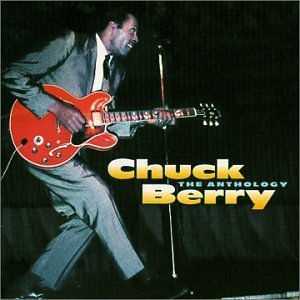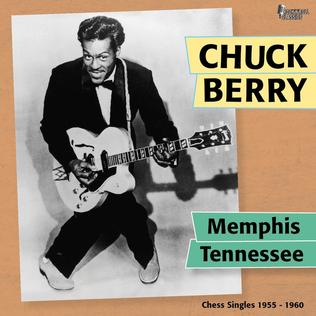
David Louis Bartholomew was an American musician, bandleader, composer, arranger, and record producer. He was prominent in the music of New Orleans throughout the second half of the 20th century. Originally a trumpeter, he was active in many musical genres, including rhythm and blues, big band, swing music, rock and roll, New Orleans jazz, and Dixieland. In his induction into the Rock and Roll Hall of Fame, he was cited as a key figure in the transition from jump blues and swing to R&B and as "one of the Crescent City's greatest musicians and a true pioneer in the rock and roll revolution".

American Top 40 is an internationally syndicated, independent song countdown radio program created by Casey Kasem, Don Bustany, Tom Rounds, and Ron Jacobs. The program is currently hosted by Ryan Seacrest and presented as an adjunct to his weekday radio program, On Air with Ryan Seacrest.

"Johnny B. Goode" is a song by American musician Chuck Berry, written and sung by Berry in 1958. Released as a single in 1958, it peaked at number two on the Hot R&B Sides chart and number eight on its pre-Hot 100 chart. The song remains a staple of rock music.

"Burning Love" is a 1972 song by Elvis Presley, written by Dennis Linde, originally released by Arthur Alexander earlier in 1972. Presley found major success with the song, it becoming his final Top 10 hit in the American Hot 100 or pop charts, peaking at number 2.

"Ben" is a song written by Don Black and Walter Scharf for the 1972 film of the same name. It was performed by Lee Montgomery in the film and by Michael Jackson over the closing credits. Jackson's single, recorded for the Motown label in 1972, spent one week at the top of the Billboard Hot 100, making it Jackson's first number one single in the US as a solo artist. Billboard ranked it as the number 20 song for 1972. It also reached number 1 on the ARIA Charts, spending eight weeks at the top spot. The song also later reached a peak of number 7 on the UK Singles Chart. In 2004, the song appeared in The Ultimate Collection.

"Ooo Baby Baby" is a song written by Smokey Robinson and Pete Moore. It was a 1965 hit single by The Miracles for the Tamla (Motown) label.
"Run Rudolph Run" is a Christmas song written by Chuck Berry but credited to Johnny Marks and M. Brodie due to Marks's trademark on the character of Rudolph the Red-Nosed Reindeer. It was published by St. Nicholas Music (ASCAP) and was first recorded by Berry in 1958, released as a single on Chess Records.
The rock and roll revival was a back-to-basics musical trend of the late 1960s and early 1970s, in a sort-of backlash against the heavier and psychedelic rock sounds then in vogue.

"(They Long to Be) Close to You" is a song written by Burt Bacharach and Hal David with sections of the early version written by Cathy Steeves. The best-known version is that recorded by American duo The Carpenters for their second studio album Close to You (1970) and produced by Jack Daugherty. Released on May 14, 1970, the single topped both the US Billboard Hot 100 and Adult Contemporary charts. It also reached the top of the Canadian and Australian charts and peaked at number six on the charts of both the UK and Ireland. The record was certified gold by the Recording Industry Association of America (RIAA) in August 1970.

Anthology is a two-disc compilation album by American rock and roll musician Chuck Berry released on July 27, 2000, by Chess Records. It duplicates in its entirety the previous anthology The Great Twenty-Eight ranked at No. 21 on the Rolling Stone 500 greatest all time albums list, as well as the entirety of the later Definitive Collection issued in 2006 as part of the Universal series. The album was later reissued and packaged in 2005 as part of the Universal Records Gold series, and simply retitled Gold. It charted at No. 110 in the UK Albums Chart.

The London Chuck Berry Sessions is the sixteenth studio album by Chuck Berry, and consists of studio recordings and live recordings released by Chess Records in October 1972 as LP record, 8 track cartridge and audio cassette. Side one of the album consists of studio recordings, engineered by Geoff Calver; side two features three live performances recorded by the Pye Mobile Unit, engineered by Alan Perkins, on February 3, 1972, at the Lanchester Arts Festival in Coventry, England. At the end of the live section, the recording includes the sounds of festival management trying in vain to get the audience to leave so that the next performers, Pink Floyd, can take the stage; the crowd begins chanting "We want Chuck!". His backing band for that concert included Onnie McIntyre (guitar), Robbie McIntosh (drums), Nic Potter (bass), and Dave Kaffinetti (piano). Both McIntosh and McIntyre would later form The Average White Band. The studio recordings included pianist Ian McLagan and drummer Kenney Jones from the bands the Small Faces and Faces.

"Sweet Little Sixteen" is a rock and roll song written and first recorded by Chuck Berry, who released it as a single in January 1958. His performance of it at that year's Newport Jazz Festival was included in the documentary film Jazz on a Summer's Day. It reached number two on the Billboard Hot 100, one of two of Berry's second-highest positions—along with Johnny Rivers cover of "Memphis, Tennessee"—on that chart. "Sweet Little Sixteen" also reached number one on the R&B Best Sellers chart. In the UK, it reached number 16 on the UK Singles Chart. Rolling Stone magazine ranked the song number 272 on its list of the "500 Greatest Songs of All Time" in 2004. He used the same melody on an earlier song, "The Little Girl From Central" recorded on Checkmate in 1955.

"Get It On" is a song by the English rock band T. Rex, featured on their 1971 album Electric Warrior. Written by frontman Marc Bolan, "Get It On" was the second chart-topper for T. Rex on the UK Singles Chart. In the United States, it was retitled "Bang a Gong (Get It On)" to avoid confusion with a song of the same name by the group Chase.
"School Days" is a rock-and-roll song written and recorded by Chuck Berry and released by Chess Records as a single in March 1957 and on the LP After School Session two months later. It is one of his best-known songs and is often considered a rock-and-roll anthem.

"Memphis, Tennessee", sometimes shortened to "Memphis", is a song by Chuck Berry, first released in 1959. In the UK, the song charted at number 6 in 1963; at the same time Decca Records issued a cover version in the UK by Dave Berry and the Cruisers, which also became a UK Top 20 hit single. Johnny Rivers's version of the song was a number two US hit in 1964.

"Song Sung Blue" is a 1972 hit song written and recorded by Neil Diamond, inspired by the second movement of Mozart's Piano Concerto #21. It was released on Diamond's album Moods, and later appeared on many of Diamond's live and compilation albums. The song was a #1 hit on the Billboard Hot 100 chart in the United States for one week, the week of July 1, and it spent twelve weeks in the Top 40. It also reached #14 on the UK Singles Chart.

"Rock On" is a song written by English singer David Essex. Recorded in 1973 and released as a single by Essex, it became an international hit. In 1989, American actor and singer Michael Damian recorded a cover version that went to number one on the Billboard Hot 100 chart. The song has been recorded many times, including a 2006 version by the English hard rock group Def Leppard.

"Use Me" is a song, composed and originally recorded by Bill Withers. It was included on his 1972 album Still Bill and was released as a single. An eight-minute live version opens the 1973 album "Live at Carnegie Hall."

American rock and roll musician Chuck Berry's discography includes 20 studio albums, 12 live albums, 31 compilation albums, 50 singles, 8 EPs, and 2 soundtrack albums.

"Reelin' and Rockin'" is a song written and recorded by Chuck Berry. It was originally recorded in 1957 and released as the B-side of "Sweet Little Sixteen".

















